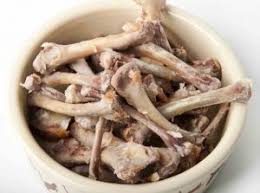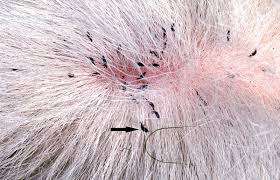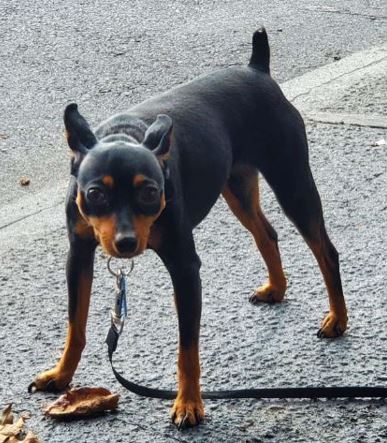Can dogs eat bacon? If so, how much can dogs eat?

Your dog should not be eating bacon. Just like almost everything in life, there are good and bad effects of eating bacon. Bacon has negative effects on dogs in the form of fat and sodium. You might find that your dog is very sensitive towards bacon as some dogs tend to be very sensitive to any form of fatty food. The salty contents in bacon likewise makes it a bad treat. A possibly deadly condition called bloat is of issue when salted food is consumed by larger dogs, triggered when the dog drinks excessive water when the salt in the bacon (or other salted food products like cured meats, ham, hotdogs, and so on) gets too much for them.
P.S - Bacon grease is just as bad if not worse than bacon itself.
The health risks associated with dogs and bacon
A fully grown dog might be able to handle some of the negative effects of eating bacon, but small pups are more prone to serious health issues. The fatty grease that is inside bacon has the potential of clogging your dog's or pup's arteries. Smaller dogs such as miniature pinschers, Pomeranians, Chihuahuas, Yorkshire terriers, and many other small breeds are more prone to pancreatitis. This however does not mean that larger dogs will not be affected by this illness. The feeding of large bacon portions is known to be one way of introducing pancreatitis into your dog's body. Pancreatitis has been known to bring on other illnesses such as lipemia (this is when there are high levels of fat in the blood), diabetes, and many others.
Pancreatitis symptoms:
- Bloating
- Depression
- Diarrhea
- Loss of appetite
- Fever
- Vomiting
- Low potassium levels
- Abdominal pain
- Increased heart rate
Some natural sources of digestive enzymes
Fruits, veggies, and other types of foods have their own natural digestive enzymes. Consuming them can enhance your food digestion.
Honey, specifically the kind that is raw , has protease and amylase. Bananas and mangoes have amylase, which likewise assists the fruits to ripen. Papaya has a kind of protease known as papain. Avocados have the digestive enzyme known as lipase. Sauerkraut, or fermented cabbage, gets digestive enzymes while going through the fermentation procedure.
How to treat your dog's inflammation of the pancreas (pancreatitis)?
The first obvious step to take in treating your dog's pancreatitis would be to get all the necessary information from your veterinarian. The vet has to do the test necessary to confirm that your pet does indeed have the disease. The main objective of treating pancreatitis is to flush the fat from the body. This is what the vet will do by administering IV fluids. These fluids are used to flush said fat from the body. Potassium might be administered if there seems to be a low potassium count in the dog's blood.
After the procedure has been completed, the vet will advise that you refrain from feeding your dog any type of hard food for the dog's pancreas to rest.
What happens if a dog eats bacon?
Salt poisoning happens in dogs that intake too much salty foods such as bacon. Sodium ion poisoning is another name for salt poisoning. There are other human food that have high salt content and is not wise to be fed to your dog. Some of these human foods are seasoned nuts, chips, and pretzels. These foods can cause an even more serious health problem in your dog known as bloat.
Some signs of sodium ion poisoning include:
- Diarrhea
- Tremors
- Vomiting
- Seizures
- Decreased appetite
Can I Feed My Dog Raw Pork?
Raw pork is usually more safe for dogs to eat than cooked pork. Raw pork can provide beneficial nutrients and contribute to a overall better diet for your dog but it shouldn't be relied upon as the sole food source.
When you consider that bacon is just cured, not actually cooked, then suddenly adding raw bacon to your dog's menu seems like a no-brainer, however, dogs should never eat uncooked pork that isn't pre-packaged or labeled "for human consumption." Uncooked pork has parasites and worms that put dogs at risk of serious health problems, including vomiting, diarrhea, stomach pain, or even worse consequences if left untreated.
Other dangerous foods for your dog
Bacon is not the only type of human food that can potentially harm your dog. Below are some other foods that can be just as bad if fed to your dog.
- Candy
- Coffee
- Grapes
- Macadamia nuts
- Chocolate
- Garlic
- Raisins
- Onions
- Avocados
- Peanut Butter(Sugar Free)

Better alternatives to bacon
Dogs and bacon have been the cause of many discussions lately. But what are the best alternatives to giving your dogs bacon?

- Lamb
- Lean Beef
- Skinless Chicken
- Liver
- Lean Deli Meats
- Cooked Eggs
- Blueberries
- Bananas
- Peeled Apples
- Watermelon/Cantaloupe/Honeydew (Seedless)
Can Bacon cause diarrhea in dogs?
Yes, diarrhea will happen in your pet if they do not get the right balance in their diet. It is always a plus to know how to combat certain types of illnesses in your pets before they arise. Diarrhea is not a disease, it is simply a condition that happens when the body tries to get rid of bad food or certain types of pathogens before they are absorbed by the body.
Mild Diarrhea treatmentThis type of diarrhea can be treated easily at home by just putting your dog on a 24-HR rice-water diet. Be sure to use only white rice as it contains the necessary active probiotic cultures. Brown rice will not suffice. After putting your dog n the 24-HR rice-water diet, it would be best to put him/her on a short fast as this will allow the gastrointestinal tract (GIT) to rest.
Serious DiarrheaIt is never advised to try and treat severe diarrhea with home remedies. The best course of action is to consult your veterinarian and they will give you the best advice.
What are probiotics?
You would have seen the mention of probiotics earlier and might be wondering what they are. Probiotics are good bacteria that are good for your digestive system. But where do we find probiotics? Probiotics can be found in foods and snacks such as yogurt, dark chocolate, some types of cheese, leafy greens and dandelion greens, onions, and many others. Yogurt and lettuce are the only ones on this list that is recommended for your pet. So one good treat to feed after your dog or dogs eat bacon is yogurt. It is a tasty treat while also helping the digestive system.
Can Bacon kill dogs?
The simple fact to whether or not bacon can kill a dog is yes. If your dog happens to eat huge amounts of bacon in one sitting, then it can kill him/her.
Can dogs eat a little bit of bacon?
Bacon, if taken in very small amounts, can be a tasty treat for dogs. However, the opposite is bad for dogs. Never allow your dog to eat more than the amount of bacon a treat would be.
How much bacon can a dog eat?
As stated above, dogs should only be allowed to eat treat size bacon. Large amounts of bacon can prove to be harmful.
Can dogs eat raw bacon?
If your dog ate raw bacon, try to find out how much him/her ate. If you found out that the amount of raw bacon that your dog ate is minuscule, then just let the bacon run its coarse. Otherwise, bring your dog to the veterinarian and let him/her know your dog ate a good portion of bacon.
Dog Treats

Dogs treats are always a better option over bacon or bacon bits. Here is a list of treats that you can give your dog
- Crunchy Treats
- Soft Treats
- Dental Chews
- Freeze-Dried and Jerky Treats
- Rawhide
- Animal Bones and Hooves
- Human food Treats
- Pig Ears
5 common people foods that can kill your dog
- Chocolate
- Cooked Bones
- Avocados
- Baked Goods
- Grapes and Raisins
- Aged or moldy food
- Raw Eggs

Whether you offer your pet chocolate or he slips a portion while you are not looking, a deadly dosage of baking chocolate for a dog is about 16-pounds might be just around 2 ounces. These 2 ounces is simply just a few bites. The dangerous element in chocolate is known as theobromine. Theobromine comes from a class of alkaloid modules that are known as methylxanthines. These are absorbed a lot more gradually in canines. This slow absorption triggers a lethal and harmful outcome: main nerve system stimulation, increased heart rate, and tightness of arteries.

The most regular and typical pet reward is, as we all know, bones. Although many pets can not easily eat cooked bones considering that they can splinter or get lodged in the throat. Some cooked bones might even get caught in the digestive system, needing surgical treatments and can even cause death in some cases. Raw bones are unlikely to splinter compared to cooked bones, however the threat is still present. Some owners will not stop providing their canines with bones, thinking the pros exceed the cons by a lot. Each year, thousands of dogs end up in the emergency room because splinters. Chicken bones are specifically most likely to get swallowed entirely or just partly chewed then swallowed. This has the potential of leading to intestinal tract perforation. Try to never feed your dog cooked bones, you are putting your dog at risk if you do so.
Avocados are harmful to dogs in large quantities. The avocado fruit contains persin, a toxic substance that can cause heart damage in dogs. A single seed can kill a small dog, so if you have them on hand to use as garnish or for any other reason, keep them away from your pets.
Avocado leaves and stems are also poisonous to dogs and cats because of their high concentration of Persin. This means you should also keep avocados out of reach from your cat.
Cookies, cakes, breads and pies aren't just bad for humans who overindulge; they're bad for dogs too. While the occasional snack won't hurt your pooch, when it comes to baked goods these treats are best left out of dog's diets.
One of the most dangerous ingredients in baked goods is xylitol, an artificial sweetener used to provide a sugar-like flavor. Although extremely toxic to dogs, it doesn't have much effect on a human's taste buds. This means that when you're baking and licking your fingers it's easy to accidentally give your pet far more than is safe. To make matters worse, xylitol has also often hidden in other seemingly harmless products like peanut butter or toothpaste!
These two are bad for canines due to their high levels of potassium. Potassium is found in high levels in human urine so eating these two will cause the dog to get sick sooner.
Potassium is a type of salt and and too much of it can cause serious side effects.
This food can also contain harmful bacteria which is likely to make them very ill, so it is best not to feed dogs with any of these types of food.
Raw eggs, like all raw foods, can carry bacteria that can make your pet sick. Eggs are perhaps more dangerous than most other types of meat since they may contain salmonella which is a serious illness that could potentially kill your dog if not treated correctly at an early stage. Raw eggs should also never be given to puppies younger than 16 weeks old as it can cause permanent damage to their developing bones and joints even when cooked.
Conclusion
When it comes to dogs and bacon, many questions have been asked. After reading this blog posts, there should be a firm understanding of why feeding your dog bacon would be a bad idea. There are many other alternatives to feeding your dog bacon and I know your dog will love them too. Alternatives such as vegetables or certain types of dog treats are tasty and healthy at the same time.




